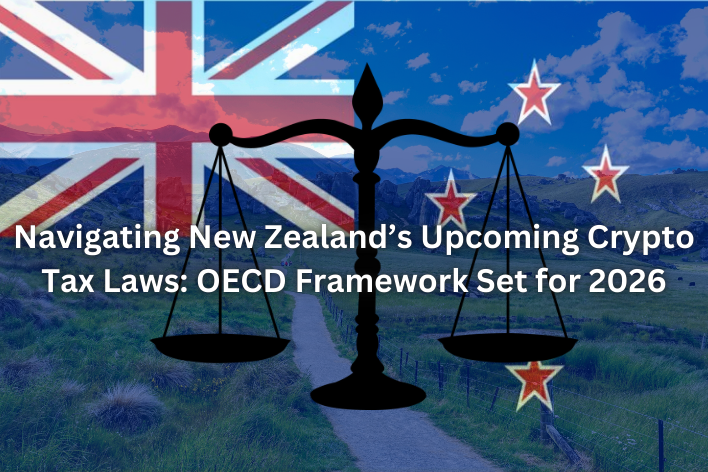Navigating New Zealand’s Upcoming Crypto Tax Laws: OECD Framework Set for 2026
Introduction:
In a transformative development for the global cryptocurrency landscape, New Zealand has announced plans to adopt the OECD's crypto reporting framework by April 2026. This landmark decision, detailed in a recent policy document, represents a significant step towards enhanced financial transparency and regulatory alignment with international standards. The OECD framework, approved in 2022, is designed to address the complexities of tax compliance in the digital asset world by establishing a standardized approach to reporting crypto transactions. For crypto investors and service providers in New Zealand, this means a new era of rigorous data collection and reporting requirements. The forthcoming changes are expected to have profound implications for how transactions are tracked, taxed, and reported, potentially altering the dynamics of the crypto market. As New Zealand moves forward with these regulations, understanding their potential impact is crucial for navigating the future of cryptocurrency investments and compliance.
Framework Overview
The Organisation for Economic Co-operation and Development (OECD) introduced its crypto reporting framework in 2022 as part of its ongoing efforts to address the complexities of tax compliance in the digital asset space. This framework sets out a comprehensive set of guidelines designed to standardize the reporting of crypto-asset transactions, ensuring that information can be efficiently exchanged between jurisdictions. Its core objective is to enhance financial transparency by mandating that crypto-asset service providers disclose detailed transaction data, which can then be shared with tax authorities across borders. This initiative aims to close loopholes that have historically facilitated tax evasion and to create a more equitable system for tracking and taxing crypto activities. By establishing a unified approach to reporting, the OECD seeks to foster greater international cooperation and reduce the opportunities for tax avoidance, ultimately contributing to a fairer and more effective global tax system.
New Zealand’s Adoption
On Monday, New Zealand officially announced its intention to adopt the OECD's crypto reporting framework, a move outlined in a detailed policy document associated with the Taxation (Annual Rates for 2024 −25, Emergency Response, and Remedial Measures) Bill. This announcement marks a significant step in New Zealand's efforts to align with global tax standards and enhance financial transparency within the crypto sector. Under the new regulations, crypto-asset service providers operating in New Zealand will be required to begin collecting comprehensive transaction data from April 1, 2026. This data must then be reported to the Inland Revenue by June 30, 2027. The proposed amendments to the Taxation Bill represent a major shift in the regulatory landscape, introducing stringent compliance requirements aimed at bolstering the fight against tax evasion. These changes will necessitate significant adjustments for firms, including upgrading their data management systems and processes to meet the new standards. This legislative move underscores New Zealand's commitment to integrating with international tax frameworks and addressing the challenges posed by the rapidly evolving digital asset market.
Impact and Implications
The implementation of the OECD's crypto reporting framework will significantly impact New Zealand's crypto-asset service providers, who will be required to meticulously collect and report detailed transaction data starting April 1, 2026. This new obligation will demand enhanced operational protocols and data management systems to ensure compliance. For investors, these changes mean increased transparency in the crypto market, which could lead to greater scrutiny and potentially affect investment strategies. As firms and individuals adapt to these regulations, there may be broader implications for the global crypto market, including heightened compliance costs and shifts in investment behavior. Internationally, New Zealand's move aligns with a growing trend towards stricter tax regulations for digital assets, potentially influencing other countries to adopt similar measures and fostering a more unified approach to global crypto tax compliance.
Conclusion:
The OECD's crypto reporting framework represents a pivotal step towards enhanced transparency and accountability in the global crypto market. New Zealand's forthcoming implementation of this framework by April 2026 marks a significant development in the regulation of digital assets, with local firms required to adopt rigorous data collection and reporting practices. For investors, these changes promise increased clarity but also introduce new compliance challenges. As the industry adjusts to these evolving regulations, we can anticipate a ripple effect across the global crypto landscape. This move not only strengthens New Zealand’s role in international tax efforts but also sets a precedent that may inspire other nations to adopt similar measures, potentially leading to a more regulated and transparent crypto environment worldwide.





